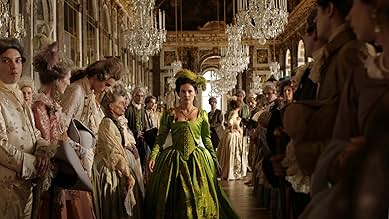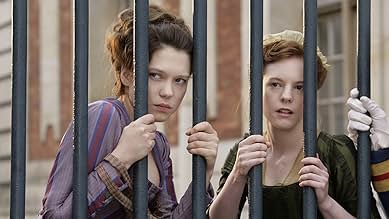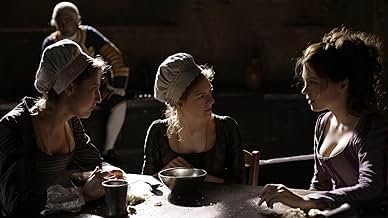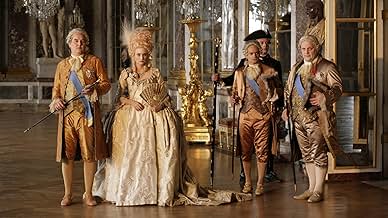Les adieux à la reine
- 2012
- Tous publics
- 1h 40m
IMDb RATING
6.2/10
9.4K
YOUR RATING
A look at the platonic relationship between Marie Antoinette and one of her female readers during the first days of the French Revolution.A look at the platonic relationship between Marie Antoinette and one of her female readers during the first days of the French Revolution.A look at the platonic relationship between Marie Antoinette and one of her female readers during the first days of the French Revolution.
- Director
- Writers
- Stars
- Awards
- 6 wins & 12 nominations total
Julie-Marie Parmentier
- La servante Honorine Aubert
- (as Julie-Marie Parmentier de la Comédie Française)
Marthe Guérin Caufman
- La domestique Alice
- (as Marthe Caufman)
Hervé Pierre
- L'abbé Hérissé
- (as Hervé Pierre de La Comédie Française)
- Director
- Writers
- All cast & crew
- Production, box office & more at IMDbPro
Featured reviews
Farewell, My Queen is a French film that covers three days in the life of servant Sidonie. She is Marie Antoinette's reader. The three days cover the early days of the French Revolution as seen through her eyes. Be advised, this is not a film about Marie Antoinette. If you are entertained by the series Downton Abbey or Upstairs Downstairs and enjoying stealing a glimpse behind the inner workings of court life this film will not disappoint.
There is no exposition at the beginning of this film. The dialog is French with English subtitles. The original audience would be expected to be familiar with the basic history and players of the French Revolution. If you are not familiar, it's a good idea to review this time period before seeing the film.
A sense of mystery is evoked by a combination of narrative reveals and soundtrack. It's a handsome film that duly contrasts the masters and servants via costumes, sets and cinematography. The performances are particularly effective as Diane Kruger and Lea Seydoux are well cast and empathetic in their roles.
There is no exposition at the beginning of this film. The dialog is French with English subtitles. The original audience would be expected to be familiar with the basic history and players of the French Revolution. If you are not familiar, it's a good idea to review this time period before seeing the film.
A sense of mystery is evoked by a combination of narrative reveals and soundtrack. It's a handsome film that duly contrasts the masters and servants via costumes, sets and cinematography. The performances are particularly effective as Diane Kruger and Lea Seydoux are well cast and empathetic in their roles.
A marvelous film. Very rarely does a film based on fact, especially a story as infamous as this one, succeed at creating such tension despite the fact that everyone knows pretty much what is going on and what will happen (United 93 springs to mind). As it is director Benoît Jacquot and his team have done a incredible job in capturing the confusion, uncertainty and pure dread that those living at Versailles in the final days of the Monarchy must have felt. Seriously, anyone who's ever dismissed period dramas and films based on true stories as "stuffy", slow and boring should give this one a shot. The cast is also exceptionally strong, led by a group of immensely talented female performers. The only downside is really the ending, unfortunately, slightly anticlimactic and a bit of a let down.
For the next few years, it must be assumed that any film featuring a popular uprising will attract lazy comparisons to the Arab Spring. The wild waters of revolution run swift in Benoit Jacquot's "Farewell, My Queen", set in the days of July, 1789. Over a wet week in France, starving Parisians storm the symbol of state tyranny, the Bastille, seizing guns and ammunition. Protesters issue a list of demands, calling for the beheadings of nearly 300 influential figures. The de facto signs of regime change are everywhere. Dead rats float in the Grand Canal in Versaille; mosquitoes terrorize the members of the Royal household. Marie Antoinette (Diane Kruger), the Queen of France, however, has escapism on her mind – she sits in bed, skim-reading the latest fashion pages.
In this task, she is aided by a number of ladies-in-waiting and her reader, Sidonie Laborde (Lea Seydoux). The young woman is called to run to the palace library and return with books and plays she reads aloud to the queen. We learn she is a member of the queen's inner circle and somewhat infatuated with her employer. She performs her duties with a mixture of fear, envy and respect. When the stench of revolution is impossible to ignore, she is told she will be guided to safety. Understandably, she feels more than a little betrayed when the queen orders her to impersonate a fleeing aristocrat, Gabrielle de Polignac, who will accompany her, dressed as a servant. If she is captured, Laborde risks death, while Polignac will abscond to safety.
This could all be familiar territory – Sofia Coppola's "Marie Antoinette" (2006) took a distinctly sweet-toothed approach to the French Revolution, imprisoning Kirsten Dunst behind tiers of artisan cakes. In Coppola's film, the French royals behaved like party-goers on an episode of MTV's "My Super Sweet 16". "Farewell, My Queen", which is based on a novel by Chantal Thomas, isn't confection of the same variety. This dimly lit and low budget film marks the end of the fantasy world of Versailles, its gilded halls, jeweled furniture and costumed courtiers. The Royal staff bow and curtsy at every available opportunity – in their spare time, they trade gossip about the private indiscretions of their employers and idly speculate the future of post-revolutionary France.
Unfortunately, the inner workings of the court of Versailles simply aren't any match for the layered politics that define teenage life on "My Super Sweet 16". While Coppola's film was candy floss masquerading as history, "Farewell, My Queen" succeeds in laboring every aspect of daily life at the Royal court. We are told, time and time again, there lurks intrigue behind every palace wall – most of it remains frustratingly off screen. At one point, I found myself thinking Laborde's chores were no different from the experiences of any gap year student – and considerably less hedonistic.
The end, when it arrives, is all too predictable. As members of the royal household are attacked on the streets of Paris, the occupants of Versaille decide to flee. As the royals leave for the last time, their carriages bursting with furniture and jewels, the staff is told "the King will now check the temperature of the throne room". Ice-cold, I would imagine. Not unlike Jacquot's French revolution.
In this task, she is aided by a number of ladies-in-waiting and her reader, Sidonie Laborde (Lea Seydoux). The young woman is called to run to the palace library and return with books and plays she reads aloud to the queen. We learn she is a member of the queen's inner circle and somewhat infatuated with her employer. She performs her duties with a mixture of fear, envy and respect. When the stench of revolution is impossible to ignore, she is told she will be guided to safety. Understandably, she feels more than a little betrayed when the queen orders her to impersonate a fleeing aristocrat, Gabrielle de Polignac, who will accompany her, dressed as a servant. If she is captured, Laborde risks death, while Polignac will abscond to safety.
This could all be familiar territory – Sofia Coppola's "Marie Antoinette" (2006) took a distinctly sweet-toothed approach to the French Revolution, imprisoning Kirsten Dunst behind tiers of artisan cakes. In Coppola's film, the French royals behaved like party-goers on an episode of MTV's "My Super Sweet 16". "Farewell, My Queen", which is based on a novel by Chantal Thomas, isn't confection of the same variety. This dimly lit and low budget film marks the end of the fantasy world of Versailles, its gilded halls, jeweled furniture and costumed courtiers. The Royal staff bow and curtsy at every available opportunity – in their spare time, they trade gossip about the private indiscretions of their employers and idly speculate the future of post-revolutionary France.
Unfortunately, the inner workings of the court of Versailles simply aren't any match for the layered politics that define teenage life on "My Super Sweet 16". While Coppola's film was candy floss masquerading as history, "Farewell, My Queen" succeeds in laboring every aspect of daily life at the Royal court. We are told, time and time again, there lurks intrigue behind every palace wall – most of it remains frustratingly off screen. At one point, I found myself thinking Laborde's chores were no different from the experiences of any gap year student – and considerably less hedonistic.
The end, when it arrives, is all too predictable. As members of the royal household are attacked on the streets of Paris, the occupants of Versaille decide to flee. As the royals leave for the last time, their carriages bursting with furniture and jewels, the staff is told "the King will now check the temperature of the throne room". Ice-cold, I would imagine. Not unlike Jacquot's French revolution.
This is a modern historical drama. Characters are not well-developed, and their motivations are not clear. Why is Sidonie so devoted to the Queen? Why does she suddenly want to have sex with the gondolier? Instead, there is LOTS of atmosphere, which makes for one slow film.
You won't learn much about what actually happened in the week that followed the fall of the Bastille, since the story, to the extent that there is a story, is told through the eyes of one of the Queen's domestics. (It does remind you that, in a day not only before computers and the internet, but even television and radio, you could live 30 miles away from momentous events and have no idea what was going on.) Nor will you learn much about Marie-Antoinette or Louis XVI. The latter is a minor character here. MA comes off as very capricious, which she evidently was. But why? Again, there is no character development.
And then, finally, the movie stops, and you go "Oh, is it over?" As I said, LOTS of atmosphere. If that floats your boat, you might like this movie.
It did nothing for me, and I'm very interested in French history.
You won't learn much about what actually happened in the week that followed the fall of the Bastille, since the story, to the extent that there is a story, is told through the eyes of one of the Queen's domestics. (It does remind you that, in a day not only before computers and the internet, but even television and radio, you could live 30 miles away from momentous events and have no idea what was going on.) Nor will you learn much about Marie-Antoinette or Louis XVI. The latter is a minor character here. MA comes off as very capricious, which she evidently was. But why? Again, there is no character development.
And then, finally, the movie stops, and you go "Oh, is it over?" As I said, LOTS of atmosphere. If that floats your boat, you might like this movie.
It did nothing for me, and I'm very interested in French history.
Before going in to see Farewell, My Queen, I really did not know too much about it and now I am glad that I knew little to nothing about the film before I saw it. I knew it was about Marie Antoinette, but that was about it. I haven't seen too many films about Marie Antoinette, other than Sofia Coppola's 2006 film which I liked quite a bit. Both films offer a different look and perspective on her, one of the things I really liked about this film as well. Lea Seydoux does a terrific job playing Sidonie Laborde, who is Marie Antoinette's reader. Seydoux allows her character to have a very curious side to her and at times she is really determined to stand up for what she believes in and can be forceful all at the same time as having an innocence to her as most young women do. It's a great performance and one that I hope leads to a successful career for her. Diane Kruger, who plays Marie Antoinette does a good job as well, but at times I did find her performance a tad melodramatic and so sometimes it felt a bit forced, or over the top. However, both Seydoux and Kruger both do show infatuation and they show it well. I can not go into any more detail than that, or I would ruin the film, but Kruger is especially good at showing Marie Antoinette's more softer and human side. A side that recognizes her fear, her flaws and truths about her own personality. Seydoux's character Sidonie is so loyal to the queen that she almost loves her, but as the film goes on, we are not really sure why. The queen can be very vicious and uncaring to Sidonie, but yet this young woman cares deeply about the queen and what is in the queen's best interest is most important for Sidonie putting the queen's needs even ahead of her own. As, I got thinking about the film, I think this part of it really had an impact on me and touched me and made me think in several ways. Here is a young woman who is more, or less an orphan and goes about her life serving and thinking of ways to keep the queen happy even though she herself lives in squalor and does not have the material wealth, possessions, or honour that the queen has. The queen seems to have everything and yet seems only to think about herself, whereas Sidonie was born with nothing and lives with nothing, but feels in her heart and soul that it is her job to serve the queen and she will do so no matter what, even if there could be consequences to her decisions. My only other complaint about the film was that at times it did feel a bit rushed and maybe moved from one event to another quite quickly, but that did not stop my enjoyment of the film, I think it just asks us as viewers to be a little more patient and do some of the character analysis, or study on our own, or even after the film is over. Even though the film does move by fast we are especially treated to a very good character study of Sidonie, who I think is the most interesting character in the film and probably the one we can relate to and even care about the most. She seems the most human whereas everyone else really does seem to be looking out for themselves and not really caring about what happens to the person next to them. The film does a credible job of showing the majestic costumes and lavish clothes and settings where Marie Antoinette lives, but at the same time it shows the dark and dingy place where Sidonie eats and sleeps and basically calls home. There is an element here showing a class struggle between these two characters and the more you think of it, the more evident it becomes. Farewell, My Queen is a good looking film with a terrific performance by Lea Seydoux, good character study and a film that gives us much to think about and even more to appreciate after the film is over and we have thought it over for awhile. As, I have said before, this is the quality of a great film.
Did you know
- TriviaIn this movie, Diane Kruger speaks French with a German/Austrian accent - which is undoubtedly how the Austrian-born Marie Antoinette would have spoken herself.
- GoofsOn several occasions when soldiers are marching through the main and side gates of Versailles, and also when Sidonie goes to Le Petite Trianon for the first time and falls into a puddle, you can clearly see the very 21st century anti-terrorism concrete security barriers and bollards flanking the gates.
- Quotes
Agathe-Sidonie Laborde: In a way, Your Majesty, you're asking me to go as bait.
La reine Marie Antoinette: An ugly word for a pretty mouth!
Agathe-Sidonie Laborde: Words are all I possess. I wield them well.
- ConnectionsReferenced in Parole de cinéaste: Benoît Jacquot (2017)
- How long is Farewell, My Queen?Powered by Alexa
Details
- Release date
- Countries of origin
- Official sites
- Languages
- Also known as
- Farewell, My Queen
- Filming locations
- Production companies
- See more company credits at IMDbPro
Box office
- Gross US & Canada
- $1,597,998
- Opening weekend US & Canada
- $72,100
- Jul 15, 2012
- Gross worldwide
- $6,366,835
- Runtime1 hour 40 minutes
- Color
- Sound mix
- Aspect ratio
- 2.35 : 1
Contribute to this page
Suggest an edit or add missing content



































